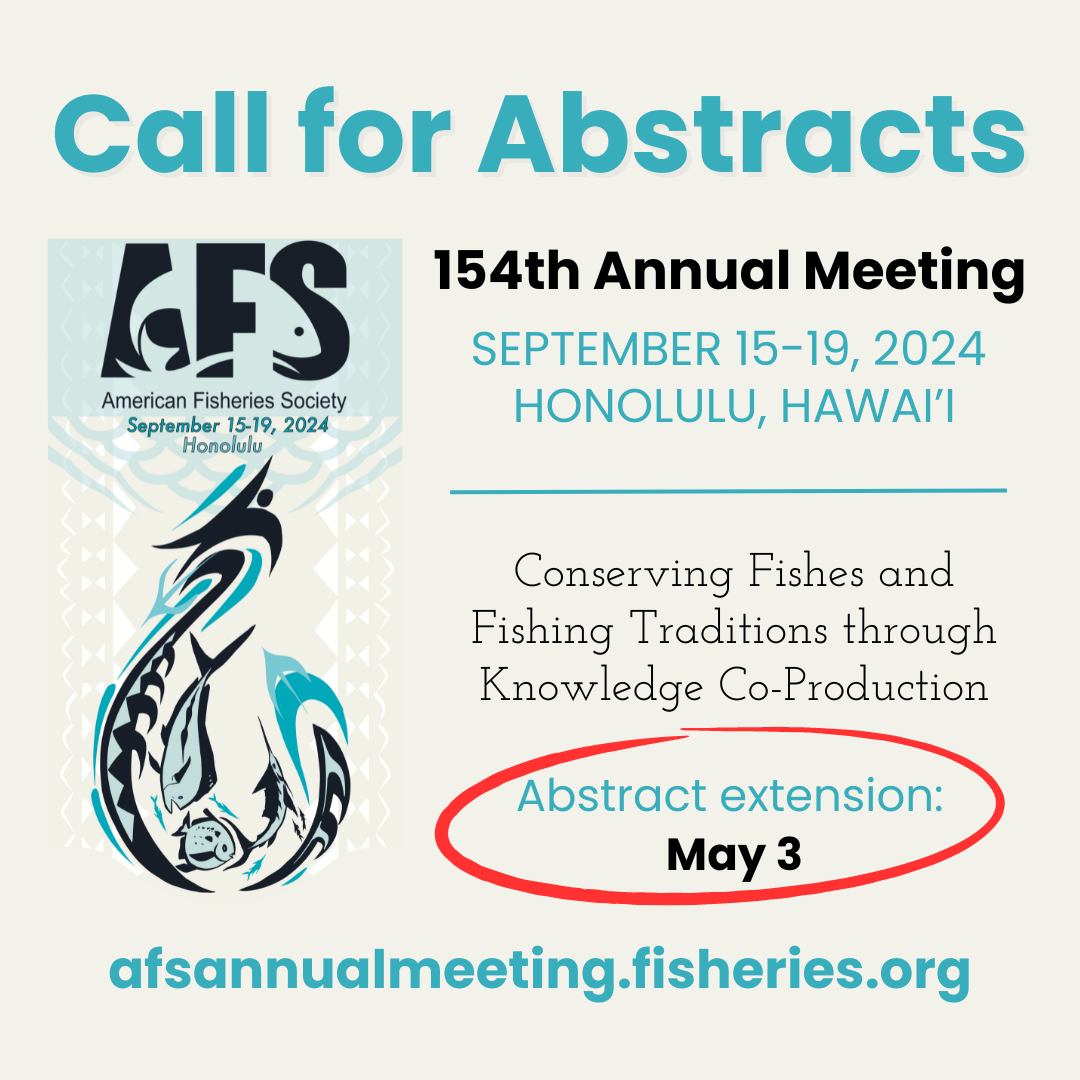AFS Book Review: Multispecies and Watershed Approaches to Freshwater Fish Conservation
Tuesday, January 28, 2020
1:00 pm Eastern Time
Presenters:
Daniel Dauwalter
Trout Unlimited
Timothy Birdsong
Texas Parks and Recreation Department
Gary Garrett
University of Texas at Austin
Registration Link:
https://attendee.gotowebinar.com/register/8364194263774714893
Description:
Freshwater systems in the United States have been altered dramatically, resulting in degradation of fish habitats and declines in native freshwater fishes. Innovative conservation approaches are needed to restore watershed processes for freshwater fish conservation while simultaneously supporting human needs. This need has driven development of innovative multispecies and watershed-based concepts, assessments, prioritizations, planning, and delivery that focus conservation efforts on entire aquatic communities at watershed scales while incorporating species life history needs and acknowledging compatible human uses. These approaches have yielded multi-agency partnerships and large-scale funding programs focused on operationalizing conservation plans and supporting meaningful and transformative conservation delivery for freshwater fishes and their habitats. This book, which was borne out of a symposium titled “Multispecies and Watershed Approaches to Native Fish Conservation: Science, Planning, and Implementation” held at the 2017 American Fisheries Society Annual Meeting in Tampa, Florida, highlights these innovative approaches to freshwater fish conservation, profiling case studies from freshwater systems throughout the United States that include diverse partnerships encompassing state, federal and local agencies, watershed councils, non-governmental organizations, and Fish Habitat Partnerships. The book also profiles highly effective and successful conservation programs and initiatives that have spanned entire careers and represent decades of unwavering commitment and passion by agencies, organizations, and individuals to restore and preserve freshwater systems. Some of these individuals have left a lasting conservation legacy through their incredibly productive and impactful careers and have offered figurative road maps to guide and inform the efforts of current and future conservation professionals. The case studies highlighted in this book simply show it is possible to successfully effect change at watersheds scales for multiple species and set a high bar for the next generation of aquatic conservationists and fisheries managers focused on the conservation of freshwater fishes.
Presenter bios:
Dan Dauwalter is the Fisheries Science Director for Trout Unlimited’s science program, where he has worked since 2008. In this role, Dan has worked on projects across the country ranging from broad-scale, spatial conservation assessments for native aquatic species to inform conservation programs, understanding the impacts of land management on and habitat requirements of fishes at multiple spatial scales, and implementation of angler-based water quality programs using mobile applications in the Midwest. Dan holds a Ph.D. in Fisheries and Wildlife Ecology from Oklahoma State University, a M.S. from the University of Arkansas at Pine Bluff, and a B.A. from Gustavus Adolphus College (St. Peter, MN). Dan currently serves as President of the Western Division of AFS and as editor for North American Journal of Fisheries Management.
Tim Birdsong is a Conservation Biologist and Chief of Habitat Conservation for the Inland Fisheries Division of Texas Parks and Wildlife Department (TPWD). In this role, Tim plans, leads, and coordinates efforts to restore and preserve the diversity of Texas freshwater fishes and their habitats. Over the past decade, Tim has adapted and transitioned TPWD’s freshwater fish conservation initiatives towards a collaborative, watershed-based, and multi-species approach. The book “Multispecies and Watershed Approaches to Freshwater Fish Conservation” profiles 11 such case studies from Texas. Tim serves on several statewide, regional, and national advisory councils, including the National Fish Habitat Science and Data Committee, Association of Fish and Wildlife Agencies Climate Adaptation Committee, and as chair of the Texas Native Fish Conservation Areas Network. Tim is also past chair of the Southeast Aquatic Resources Partnership and Great Plains Landscape Conservation Cooperative. Tim holds a M.S. in Fisheries from Louisiana State University and a B.S. in Biology from Southeastern Oklahoma State University.
Dr. Gary Garrett is a research biologist in the Department of Integrative Biology at the University of Texas at Austin. From 2009 – 2013, he was the Director of the Watershed Conservation Program at the Texas Parks and Wildlife Department. From 1982 – 2008, he worked as a Conservation Biologist in the Research Division of TPWD. His interests are centered on the conservation of aquatic natural resources and he has authored more than 100 scientific publications on the subject. He has a long history of working cooperatively with private landowners, local communities, NGOs, universities, and other state and federal agencies to protect, restore and enhance critical habitats. In particular, he has worked on conservation in the Chihuahuan Desert region over a period spanning five decades.





